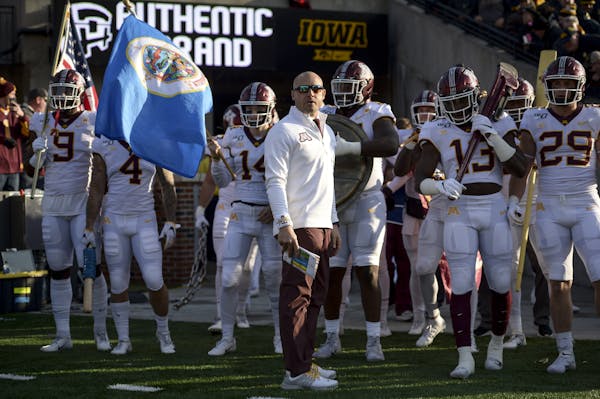Gophers quarterback Tanner Morgan is in the concussion protocol but "making progress," coach P.J. Fleck confirmed Tuesday, leaving the sophomore questionable for Saturday's game at Northwestern.
Fleck didn't offer specifics, but Morgan's availability will depend on how quickly he proceeds through the steps in the well-established concussion protocol the Gophers athletics department uses.
"That's all out of my hands," Fleck said. "That's all up to our medical staff and trainers, who are all doing a great job."
If Morgan isn't ready, Fleck said, the team will turn to one or possibly two true freshmen to fill in for the starting quarterback. Backups Cole Kramer and Jacob Clark have played sparingly this season. Kramer came in for a Morgan after he was injured this past Saturday.
"Whoever plays better in practice this week, if it comes down to it," Fleck said. "It's a competition between Jacob and Cole, and they're both getting better."
Morgan, who ranks sixth in the nation with a 186.9 passer rating, endured back-to-back sacks on the Gophers' final drive in last week's 23-19 loss at Iowa, leaving the field woozy but still pleading with Fleck to let him finish the game.
It was the first of those two sacks that injured Morgan, as Fleck alluded to on his weekly KFAN radio show. Fleck praised the medical staff for noticing Morgan's symptoms and forcing him to go down on the field.
"Some people are saying we're trying to get [an injury timeout]," Fleck said. "… We would never jeopardize the game or the integrity of the game. Our quarterback's hurt, and he's in concussion protocol."
Every Gophers player undergoes a series of preliminary assessments, including a concussion baseline test. The staff can then use that, along with other medical tests, to diagnose the player as soon he's spotted on the field showing possible symptoms and removed from play.
The severity of the concussion dictates the care, which can be as simple as limiting screen time or schoolwork, according to the athletic department's guidelines.
But a medical professional must clear the player before he can return to playing only after the player successfully completes a gradual increase in physical activity.
The progression could go, for example, from light aerobic exercise such as a stationary bike, to a sport-specific activity such as agility drills, then noncontact practice, then full-contact practice.
If symptoms reappear at any stage, the progression stops, and the player must return to the most recent symptom-free step.
Some players complete this in time for the next game. For others, symptoms linger for weeks or months. Either way, it can be a frustrating process.
"He's a competitor," Fleck said of Morgan. "That's why it's completely up to the medical staff because he is such a competitor. He wants to get back out there, but the medical team's got him, and they'll make the decisions for him."
With uncertainty at quarterback, the coaches still set the game plan for Saturday with Morgan in mind, Fleck said. But the plan might change depending on what Kramer and Clark show they can manage throughout the week. The coach indicated he might use both backups against Northwestern.
On the radio show, Fleck also called wildcat quarterback Seth Green a "viable option." Green started his Gophers career as a quarterback after playing the position in high school before transitioning to tight end and wide receiver.
But Fleck is unsure of when he'll ultimately make the QB decision.
"It's hard to tell because Tanner's day-by-day," Fleck said. "So based on his status, and as we keep getting later in the week, we'll know more. Then from there, I'll have his information, and the data I have, based on how well Jacob and Cole have performed in practice, and we'll make a decision."



